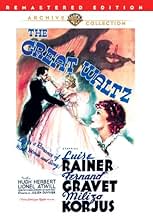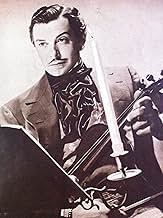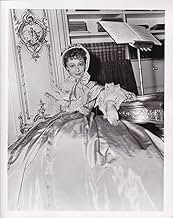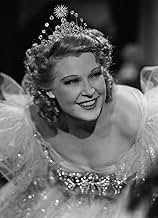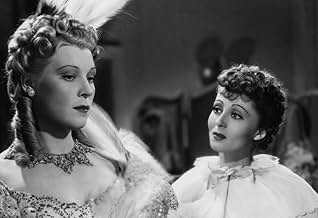IMDb RATING
6.4/10
1.4K
YOUR RATING
Johann Strauss II pursues his passion for waltzes in 1845 Vienna, facing societal resistance. His music gains popularity through opera singers, leading to fame and personal conflicts between... Read allJohann Strauss II pursues his passion for waltzes in 1845 Vienna, facing societal resistance. His music gains popularity through opera singers, leading to fame and personal conflicts between his wife and a passionate affair.Johann Strauss II pursues his passion for waltzes in 1845 Vienna, facing societal resistance. His music gains popularity through opera singers, leading to fame and personal conflicts between his wife and a passionate affair.
- Won 1 Oscar
- 2 wins & 3 nominations total
Fernand Gravey
- Johann Strauss
- (as Fernand Gravet)
Sig Ruman
- Wertheimer
- (as Sig Rumann)
Ernie Alexander
- Revolutionary
- (uncredited)
Featured reviews
Julien Duvivier, the great French director, had a brief career in Hollywood during WWII. Alas, the movies he was involved with, didn't fare as well as the ones he did in France. It must have been difficult for a man of his stature to try his hand at film making in America because of problems with artistic control of his pictures and the way things were done in Hollywood.
"The Great Waltz" was a fine example of what M. Duvivier could do. This glorious 1938 MGM film was one of the most loved films of that period. Not only that, but even if the subject matter, Johann Strauss' life was not accurate, at least his great music is heard in the film. The exquisite art direction Cedric Gibbons gave the picture and the beautiful costumes from Adrian made this a favorite of the movie going public of that time.
The life of the struggling musician who had a lot of talent, but whose music was a departure from what has been heard in Vienna before him, was something movies loved to tell. Whether or not this was a true account of the composer's life, it's still a visually rich film.
Fernand Fravey as Strauss gives a good performance. Luise Ranier makes the suffering and self-sacrificing Poldi, one of her best creations. The true star of the film though, is Milizia Korjus, who as the gorgeous soprano Carla Donner steals the show with her singing and her looks. Hugh Herbert, Alma Kruger, Curt Bois, and the rest of the cast do great work for Julien Duvivier.
"The Great Waltz" is a film that's not seen often these days and it's a shame because it's an excellent excuse for going back to that period and the great music Strauss gave to the world.
"The Great Waltz" was a fine example of what M. Duvivier could do. This glorious 1938 MGM film was one of the most loved films of that period. Not only that, but even if the subject matter, Johann Strauss' life was not accurate, at least his great music is heard in the film. The exquisite art direction Cedric Gibbons gave the picture and the beautiful costumes from Adrian made this a favorite of the movie going public of that time.
The life of the struggling musician who had a lot of talent, but whose music was a departure from what has been heard in Vienna before him, was something movies loved to tell. Whether or not this was a true account of the composer's life, it's still a visually rich film.
Fernand Fravey as Strauss gives a good performance. Luise Ranier makes the suffering and self-sacrificing Poldi, one of her best creations. The true star of the film though, is Milizia Korjus, who as the gorgeous soprano Carla Donner steals the show with her singing and her looks. Hugh Herbert, Alma Kruger, Curt Bois, and the rest of the cast do great work for Julien Duvivier.
"The Great Waltz" is a film that's not seen often these days and it's a shame because it's an excellent excuse for going back to that period and the great music Strauss gave to the world.
This fictional account of Johann Strauss' life is highlighted by one of the most exquisite scenes in musical history--far from real of course--in which the composer and an operatic diva are driven through the woods in horse and buggy while the countryside comes alive with the sound of music. The pastoral beauty of the scene itself combined with the intricate way 'Tale of the Vienna Woods' is woven into the musical scene (as composer Strauss begins humming the tune along with his diva friend) is just one of the charming highlights of this MGM musical.
Swirling waltzes are captured with such superb angles in the Oscar-winning camerawork, it's no wonder David O. Selznick was impressed enough to insist that his own technical staff derive inspiration from viewing the film.
Soprano Miliza Korjus does some excellent trills as the operatic diva who steals Strauss from his wife (temporarily) until the obligatory happy ending. Luise Rainer suffers gracefully (in an insufferable role as the wife!!) and Fernand Gravet does well as the composer. His scenes with Miliza Korjus are what makes the film the gem that it is. She all but steals the film and was nominated for a Supporting Actress Oscar and then disappeared from the American scene, returning to Europe to resume her operatic career.
Swirling waltzes are captured with such superb angles in the Oscar-winning camerawork, it's no wonder David O. Selznick was impressed enough to insist that his own technical staff derive inspiration from viewing the film.
Soprano Miliza Korjus does some excellent trills as the operatic diva who steals Strauss from his wife (temporarily) until the obligatory happy ending. Luise Rainer suffers gracefully (in an insufferable role as the wife!!) and Fernand Gravet does well as the composer. His scenes with Miliza Korjus are what makes the film the gem that it is. She all but steals the film and was nominated for a Supporting Actress Oscar and then disappeared from the American scene, returning to Europe to resume her operatic career.
A perfect and absolute delight from beginning to end. The great music of Johann Strauss is performed in such beautiful, elaborate settings! MGM reproduced Vienna and the era perfectly. It is too bad this was the only film in which Miliza Korjus appeared. Such a magnificent voice and charming personality! The carriage ride in the Vienna Woods and that final, unbelievable, note she holds for what seems like eternity are never to be forgotten. Luise Rainer is wonderful and could always convey such emotion without ever uttering a word. Perfect casting, with so many great character actors in supporting roles.
Before I started these comments, I first read many of the others made by a wide range of people - I was amazed to find that some were reading far too much into the storyline,( which everyone who has seen the movie knows it is pure hokum) or belittling the film for its treatment of the life of Johann Strauss. Why not go and see it, and enjoy the sheer entertainment of the Music, the acting of Luise Rainer, the voice of Miliza Korjus (who will ever forget her rendition of "One Day When We Were Young" - who cares if Strauss did or did not write it!), So "The Tales from the Vienna Woods" was written overnight - does it matter that free licence was taken, surely the name of the game is to entertain, and this film does that. Hugh Herbert and Lionel Atwill add fun and spice to one of the more entertaining musicals of the 1930's.
10guidon7
Perhaps the number one Hollywood musical film of all time. "Gorgeous Korjus" was coined and used by Louis B. Mayer to promote her film career, which understandably would be short. Not only is she gorgeous in GW but turns in an excellent acting performance which drew an academy award nomination. Her acting role rivals or exceeds consummate actress and two-time academy award winner, Luise Reiner. Displaying the temperament of a real primadonna, Miss Korjus turns on her good and bad sides when you least expect it. Vocal waltzes are extremely difficult to sing and Korjus with her coloratura soprano does admirably. Frenchman Fernand Gravet is believable as Strauss (as far as the film is believable) and ably supported by the likes of Lionel Atwill and Hugh Herbert along with many others, few of whom have a Teutonic accent, but we still have a romantic view of old Vienna. It is not a factual biography, which is stated at the beginning of the film, but there are elements of truth in the composite of Strauss the Elder and Strauss the younger as performed by Gravet (Strauss the Younger was a womanizer and while married actually had a liaison with an opera singer, among others). The Vienna Woods segment is pure joy. Strauss playing Tales from the Vienna Woods on his violin and Carla Donner singing in accompaniment's, their whirling dancing, ending up on the ground, where Strauss goes no further and wistfully admits "Carla, I'm married." The audience, I think, expects a tantrum from Donner at this revelation, but she gracefully takes it in stride and fools us once again with her unpredictability! This scene, to me, was the high point of an exceptional film of the type we shall never see again.
Did you know
- TriviaToscha Seidel, the Russian virtuoso violinist, was hired especially to dub the solos on the soundtrack for Johann Strauss (Fernand Gravey) and began a new career working as a concert master at MGM and other studios.
- Quotes
Johann 'Schani' Strauss II: Thanks for firing me, Mr. Wertheimer. Goodbye, you worms!
- ConnectionsFeatured in Another Romance of Celluloid (1938)
- SoundtracksTales From the Vienna Woods, Op.325
(1868) (uncredited)
Music by Johann Strauss
Lyrics by Oscar Hammerstein II
Hummed by Fernand Gravey as it is being composed
Sung by Miliza Korjus
Played as background music often
- How long is The Great Waltz?Powered by Alexa
Details
- Runtime1 hour 44 minutes
- Color
- Aspect ratio
- 1.37 : 1
Contribute to this page
Suggest an edit or add missing content



